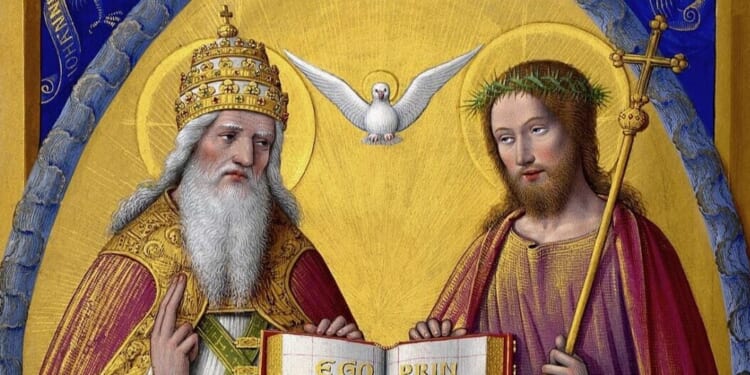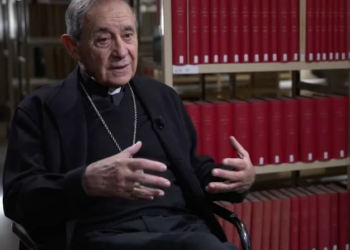St. Elizabeth of the Trinity (1880-1906) is a saint for our day, being recently canonized in 2016 and teaching us the path of contemplative prayer amidst our ordinary day-to-day lives. She lived as a cloistered Carmelite nun yet was united to a large number of lay people living in the world, especially through her letters to them. She shows them, and us, the healthy tension between solitude with God and communion with others. Solitude and communion in our lives are ultimately based on union with our God who is both One and Three.
Shortly before her death, she expressed her desire to pray in heaven for souls to be drawn more deeply into contemplative prayer: “My mission in heaven will be to draw souls by assisting them to go out of themselves in order to cleave to God by a wholly simple movement of love, and to keep them in this profound silence within, which will allow God to communicate Himself to them and to transform them into Himself” (Letter 335). We pray to E3 (as I affectionately refer to her) to accomplish this prayer in our lives. If you like rhymes: E3, pray for me! May our solitude and communion draw us deeper into our Beloved Three and communion with others!
There is a beautiful and somewhat paradoxical name of the Triune God in Elizabeth’s celebrated prayer to the Trinity. She calls the Trinity “Infinite Solitude.” Letter 330, written a couple weeks before her death to a family friend, shows the implications of being alone with such a God who is not just the Alone but Infinite Solitude. Communing with such a God in solitude meant that Elizabeth’s solitude also became infinite! Whereas initially solitude can feel confining, in the end, it breaks out into infinity when that solitude is spent in intimacy with the Triune God.
In the last stanza of her prayer, Elizabeth exclaims, “Trinity, my All, my Beatitude, Infinite Solitude, Immensity in which I lose myself!” Elizabeth’s solitude breaks out into infinity as her heart makes space for others and embraces them. Her solitude is expansive and infinite.
Elizabeth’s infinite solitude, like ours, is enclosed with God alone while expanding to make room for everything in God’s wide embrace. This infinite solitude takes her out of herself and enlarges her outreach and sphere of influence to persons in the world. In solitude, she is given a mission and purpose larger than herself, reaching out to the whole world. In Letter 330, she tells Madame Gout de Bize that in heaven she will be actively thinking of her and will win for her a grace of intimate union with God. Even in heaven, her heart will be turned to others:
Oh, believe that up there, in the Furnace of Love, I will actively think of you. I will ask you, if you wish—and this will be the sign that I have entered Heaven—for a grace of union for you, of intimacy with the Master; I entrust to you what has made my life an anticipated Heaven: believe that a Being named Love dwells in us at all times of day and night and asks us to live in communion with Him, to receive all joy, as well as all suffering, as coming directly from His love; this lifts the soul beyond what is passing, beyond what is going on, beyond that which crushes, and gives it rest in peace, the cherishing love of God for His children. Oh, dear Madame, what waves of tenderness I feel rising from my heart to yours (L330).
In confiding her secret to Madame of how she lived her earthly life as an anticipated heaven, Elizabeth points to the God dwelling within; and this divine Being is “a Being named Love.” In being alone with the Alone, she is alone with the Three, and they are Love. The Three are an outpouring of self-giving love in the unity of the one divine nature.
The Trinity dwells in solitude with nothing other than God, but in a boundless Solitude without confines. There is an outpouring of love in their eternal processions, and there is a freely chosen outpouring of love in creation and redemption. This is the Being named Love who dwelt alone in Elizabeth’s heart, and so others had a place in her heart as well. Hers was a heart alone, yet expansive.
She tells Madame, “what waves of tenderness I feel rising from my heart toward yours.” She then reminisces about herself strolling with Madame along the ocean and tells her to return to those avenues and meditate, “along the avenues of Boaca. Go and meditate in one of them and there, before God, you will feel her whole soul close to yours, for in Him we will be one for time and eternity!” The word one here italicized is actually circled by Elizabeth in the original letter. So Madame is to imagine being with Elizabeth in a narrow avenue along the seemingly boundless ocean, while “waves of tenderness” rise from Elizabeth’s heart toward Madame’s. Perhaps the circled one, in the shape of the sea (!), is meant to convey that they are one in the ocean of God’s Love.
Simply taking in the scene of the broad and wide-open ocean before them while strolling in the narrow avenue, with waves of tenderness overflowing from Elizabeth, is breath-taking and laden with symbolism. The boundless ocean, among the natural world, is a fine image of God and His infinity. God is Infinite Solitude as an Ocean of Love. And the outpouring of Triune Love flows forth as waves of tender love flow out from Elizabeth’s heart and her own infinite solitude. Elizabeth and Madame are one in that Ocean of Love. There is no need for Elizabeth to leave her solitude in embracing Madame for both are contained in that Ocean of Love which is God, Infinite Solitude.
We do not know if this was Elizabeth’s deliberate intention in weaving together the images and ideas she did at the end of this letter as she prepared a “meditation” for her friend, as she called it, but whether intended or just intuitively expressed, the rich symbolism is there of the Ocean of Love that we abide in with a single-hearted devotion and find others dwelling in too. Solitude with the Triune God is not restrictive but expansive so that our solitude can also become infinite.
Alone with Infinite Solitude, our solitude becomes infinite. Alone with the Divine Being called Love, our solitude breaks out into infinity as we make space in our hearts for others. Our waves of tenderness for others need not draw us away from our solitude because they too are embraced in the Ocean of Love we dwell alone with. We are one with the others we find in this Ocean of Love while remaining distinct. For the Infinite Solitude Itself is One and Three. In this triune God is our All and our communion with others.
O my Three, my All, my Beatitude, infinite Solitude, Immensity in whom I lose myself! …Bury Yourself in me so that I may bury myself in You!
Editor’s Note: For more on St. Elizabeth of the Trinity, check out Fr. Ignatius’ new book, Named for Glory: St. Elizabeth of the Trinity’s Identity and Mission, available from Sophia Institute Press.
Image from Wikimedia Commons












